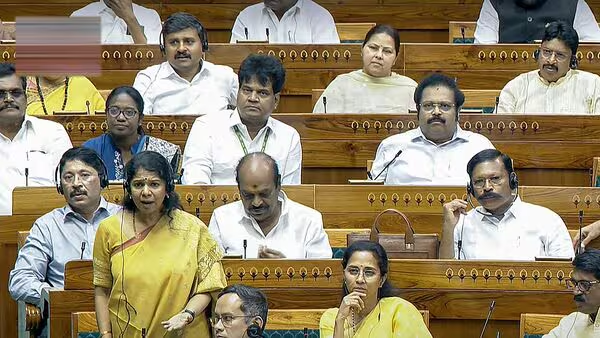A heated debate over the three-language formula outlined in the National Education Policy (NEP) 2020 erupted in the Lok Sabha after Union Education Minister Dharmendra Pradhan and Dravida Munnetra Kazhagam (DMK) members exchanged sharp words. The controversy has reignited tensions between the Centre and Tamil Nadu, where leaders allege that the NEP’s language policy is a backdoor attempt to impose Hindi on the state.
What Sparked the Controversy?
The confrontation began after Pradhan made remarks about the Tamil Nadu government and its people, which DMK members found offensive. His remarks were later expunged by Lok Sabha Speaker Om Birla. During the heated exchange, Birla also warned DMK MP Dayanidhi Maran of suspension if certain remarks were officially recorded.
Outside Parliament, Tamil Nadu Chief Minister MK Stalin accused Pradhan of “arrogance” and “insulting the people of Tamil Nadu.” Stalin called the minister’s comments reflective of an “arrogant king” and demanded accountability.
Background of the Three-Language Formula
The three-language formula, part of the NEP 2020, requires students to learn three languages, at least two of which must be native to India. The policy aims to promote multilingualism while allowing flexibility for states and students to choose their preferred languages.
The Centre argues that the three-language formula is designed to improve employment opportunities and promote national unity. However, Tamil Nadu has historically followed a two-language policy (Tamil and English) and opposes any mandate to introduce Hindi.
What Both Sides Say
Centre’s Position
Union Minister Dharmendra Pradhan has maintained that the NEP does not impose Hindi on any state. He claimed that Tamil Nadu’s opposition stems from political motives rather than policy issues.
“NEP 2020 is focused on different languages of India, be it Hindi, Tamil, Odia, or Punjabi. All the languages have equal importance,” Pradhan stated in an interview.
DMK’s Position
DMK leaders, including MP Kanimozhi, argue that the NEP’s language policy violates Tamil Nadu’s long-standing two-language policy. They insist that introducing a third language should be optional rather than compulsory.
“Learning another language over and above these two should be a child’s choice. Why are we forcing students to learn three languages?” Kanimozhi said.
Financial Pressure and Political Tensions
The row intensified after Pradhan warned that the Centre might withhold ₹2,400 crore in funding under the Samagra Shiksha scheme if Tamil Nadu refused to implement the three-language formula. DMK MP T Sumathy accused the Centre of using funding as leverage, calling it a violation of cooperative federalism.
“This is a death knell for cooperative federalism,” Sumathy stated.
Key Provisions of NEP 2020 on Language
Medium of Instruction
- The NEP recommends that the medium of instruction should be the mother tongue, home language, or regional language until Grade 5, preferably extending to Grade 8.
- Students may switch languages in Grade 6 or 7 as long as they demonstrate basic proficiency in three languages by the end of secondary school.
Three-Language Formula
- The three languages must include at least two Indian languages.
- States have the flexibility to decide which languages to offer, including classical languages such as Tamil, Telugu, Kannada, Malayalam, Odia, Sanskrit, and others.
Language Teachers
- The NEP calls for increased recruitment of language teachers in regional languages, with support from both central and state governments.
Why Tamil Nadu Opposes the Three-Language Formula
Tamil Nadu has followed a two-language policy (Tamil and English) since the 1930s and has resisted previous attempts to introduce Hindi. Widespread anti-Hindi protests occurred in the state in the 1930s and 1960s. DMK leaders argue that introducing a third language would disproportionately favor Hindi-speaking states and undermine Tamil culture.
The DMK maintains that the NEP’s push for a third language reflects a broader political strategy by the ruling BJP to expand its influence in southern states.
Political Impact
The language row comes ahead of the Tamil Nadu Assembly elections. The BJP, which has never won an assembly election in Tamil Nadu, is seen as attempting to gain political ground through the NEP’s language policy.
Conclusion
The NEP’s language policy remains a contentious issue in Tamil Nadu. While the Centre argues that the policy promotes multilingualism and national unity, Tamil Nadu leaders view it as an attempt to impose Hindi. The debate reflects deeper political tensions over language, identity, and federalism in India’s evolving educational landscape.











